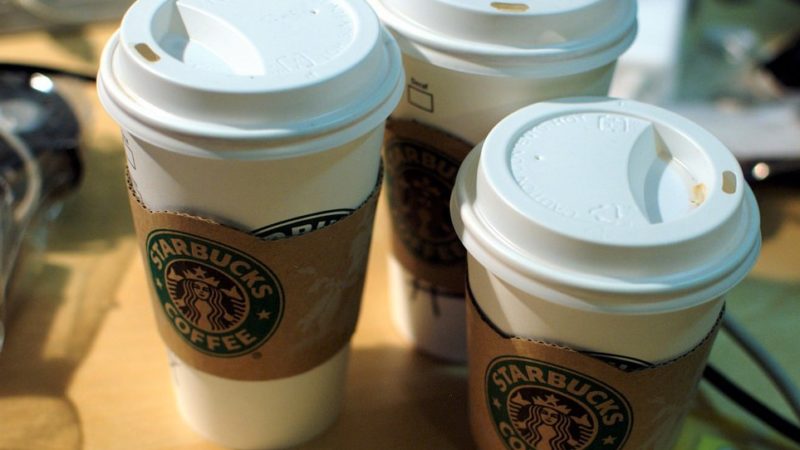The Environmental Audit Committee has accused coffee companies of misleading the public when it comes to recycling - while we pick up the tab.

The big chains have gone quiet, the plastic lobby know they’re on the losing side, and there is a general sense that ‘this should probably happen’. But as welcome as the reaction to the ‘latte levy’ has been, we’re at risk of letting coffee chains off the hook.
2.5 billion coffee cups are thrown away in the UK each year. That’s 38 per person. It’s an astonishing amount of waste and plastic going into our landfill and, often, our seas.
That’s because only three companies recycle coffee cups in the UK. Yet coffee chains ‘greenwash’ their cups with logos saying they are recyclable. Technically true – but very misleading.
But what particularly grates is the fact that it is us who pick up the tab for this PR boost. 90% of packaging waste disposal is paid for by the public.
Today’s report from the Environmental Audit Committee notes:
“While disposable coffee cups are recyclable, they are not recycled. However, we have found that there is a significant public belief that disposable coffee cups are widely recycled.
“Coffee shops are communicating to customers that disposable cups are recyclable, but it is not clear that they need to be disposed of through separate recycling systems. This confuses the consumer, resulting in the contamination of on-street and office bins and local authority collections as people dispose of disposable cups in mixed recycling.”
The Committee are essentially accusing – with justification – Starbucks and co of fibbing to the public.
Fiona Nicholls, Oceans Campaigner at Greenpeace UK, told Left Foot Forward:
“Almost everything is ‘recyclable’ if you’re willing to spend huge amounts of money separating badly designed products into their component materials and putting them thorough complicated and expensive reprocessing. What matters is whether something is actually recycled, and with coffee cups 99% of them aren’t.
“This is largely because in the UK the taxpayer picks up the tab for recycling, and so manufacturers are spared the cost of paying for their bad design.
“Hand responsibility for recycling their waste back to the manufacturers, and we’ll soon see their products improve.”
There will be some push-back against this policy. We heard shy bleating from industry ‘experts’ on the Today programme this morning, saying other approaches to a deposit scheme should be taken instead.
But why? Taxpayers and the planet are picking up the bill for coffee companies and manufacturers who can’t be bothered – and have no incentive – to get their house in order.
Deposit schemes aren’t radical – several European countries, including Germany and Sweden, already have them without complaint.
And we have evidence from here, too. Plastic bag use dropped by 85% in UK supermarkets after the charge was introduced in 2016. Small nudges can cause behavioural changes which have a huge impact on the macro level.
The problem is urgent. One truckload of plastic goes into our ocean every minute. We can and must play our part in stopping that.
Behind the scenes, there’s no doubt the plastic industry is pushing back against today’s report. But we can’t be expected to pick up the tab any longer for coffee companies’ greenwashing.
So let’s get on with it. In true British form, we’ll wonder why we didn’t do it earlier.
Josiah Mortimer is Editor of Left Foot Forward. Follow him on Twitter.




2 Responses to “How taxpayers are subsidising coffee chains’ green spin”
Craig Mackay
This is a wonderful example of how politicians deal with challenging matters. All they can think of is taxes/surcharge/money penalties. There is another approach which had there been any scientists on the panel would have helped them sort out the problem immediately. The problem with these disposable coffee cups is that the plastic inner, necessary to make it waterproof, is bonded to the cardboard outer, necessary to allow it to be lifted and provide insulation.
All you have to do is require the coffee companies to use recyclable cups which can be done most easily as follows. The plastic inner sleeve to be placed inside a cardboard outer sleeve immediately before serving. The inner and outer are easily separated later and each can be recycled independently.
Alasdair Macdonald
While I agree that the specific proposal Craig Mackay puts forward is a good one, it will not solve the problem. I agree with the article that we need to put the onus on to the businesses which produce the cups and packaging (because it is almost all fast food and drink containers) and, if that includes fining and taxing then so be it. The industry and the retail side are definitely trying to put responsibility on to taxpayers. It is resisting deposit schemes mendaciously branding them as ‘unworkable’, despite them working well across the world and they worked well when I was a boy, as I earned pocket money by returning bottles. The industry also managed a propaganda coup in that it had the BBC and others labelling the ‘latte levy’ as a consumers’ problem. On phone-ins we were told ‘how disgusting it was to have to put coffee into reusable containers which the owners (sic) never cleaned.’
Since I retired I have done voluntary work which includes clearing litter from footways and green spaces. Almost all the litter is containers, cutlery and wrappings from fast foods and drink and cigarette ends. The main culprits are football crowds and secondary school and college students.
It is a wider issue than just coffee cups, but I am happy to make a start with them. (PS – I have a reusable coffee cup.)